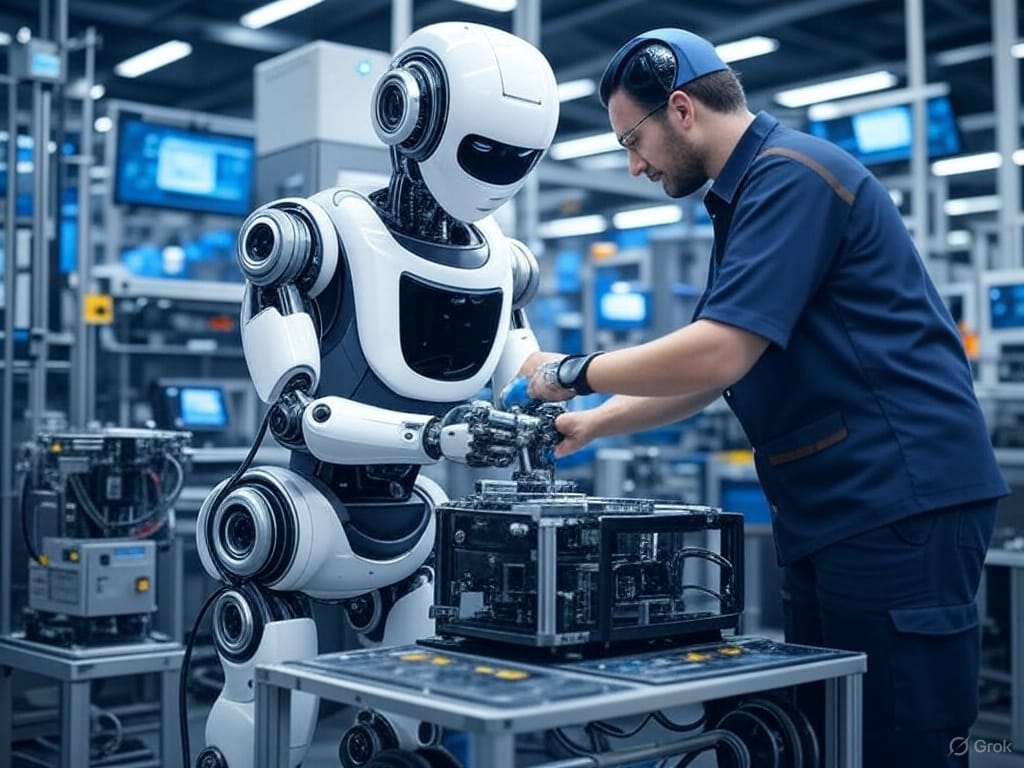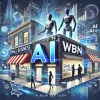
By Elke Porter | WBN News Global/WBN AI | May 12, 2025
In 2018, a family-owned bakery in Germany faced a crisis: labor shortages and rising costs threatened its survival. Enter Universal Robots, a Danish company specializing in collaborative robots, or "cobots." Integrated with artificial intelligence (AI) and the Internet of Things (IoT), these cobots kneaded dough, monitored ovens, and packaged goods alongside human bakers.
The result? Production doubled, waste fell by 25%, and an AI-driven app enabled custom orders. “I feared robots would replace us,” the owner admitted, “but they saved our business and freed us to innovate.” This story captures the essence of the Fourth Industrial Revolution—Industry 4.0—a transformative era reshaping how we live, work, and connect.
Unlike the steam-powered First Industrial Revolution, electricity-driven mass production of the Second, or computer-led automation of the Third, Industry 4.0 fuses physical, digital, and biological systems. AI, robotics, blockchain, IoT, and biotechnology drive this shift.
For instance, AI algorithms, like those in Google Health’s diabetic retinopathy detection, reduce misdiagnosis by up to 20%, per a 2021 Lancet study. IoT connects devices—like 5G-enabled sensors in Siemens’ Amberg factory, which cuts waste by 30%. Blockchain ensures transparent supply chains, while CRISPR gene-editing advances personalized medicine. These technologies are widely recognized as pillars of Industry 4.0. For example:
- AI and machine learning enable predictive analytics and autonomous systems.
- Robotics powers automation in manufacturing and logistics.
- Blockchain enhances transparency in supply chains and data security.
- IoT connects devices for real-time data sharing.
- Biotechnology drives advancements in healthcare, such as CRISPR and personalized medicine.
This revolution redefines economies and societies. In manufacturing, smart factories use predictive analytics to optimize production. In healthcare, wearables like Apple Watches monitor heart rates, saving lives through early alerts. Yet, the workplace is transforming rapidly.
A 2020 World Economic Forum report predicts automation will displace 85 million jobs by 2025 but create 97 million new roles in data science, cybersecurity, and robotics. Demand for data scientists, for example, has surged over 650% since 2012, per LinkedIn.
Industry 4.0 offers immense opportunities but poses challenges. Privacy concerns loom large—2.6 billion personal records were exposed in 2024, per cybersecurity reports. Job displacement threatens routine roles, particularly in retail and manufacturing.
Digital inequality persists, with 2.6 billion people offline, per a 2023 UN report. Ethical dilemmas, like bias in AI algorithms, demand robust governance. Governments, businesses, and individuals must collaborate to ensure inclusive growth and responsible innovation.
It is important to note that machines still don’t "think" in a human sense; AI and machine learning enable them to process data, recognize patterns, and make decisions based on algorithms. For example, AI models like neural networks can optimize processes in real-time, but they lack consciousness or independent reasoning. The anthropomorphic language is common in popular discourse but can oversimplify.
The Fourth Industrial Revolution is more than technology—it’s a societal transformation. From small bakeries to global corporations, it empowers adaptation and creativity. By embracing change with intention, we can harness innovations like cobots, AI diagnostics, and smart systems to benefit all. The future is here, powered by connectivity and ingenuity, and it’s up to us to shape it for the greater good.
#Industry 40 #Fourth Industrial Revolution #AI Innovation #Smart Factories #Digital Transformation #Future Of Work #WBN AI #WBN News Global #Elke Porter
Connect with Elke at Westcoast German Media or on LinkedIn: Elke Porter or contact her on WhatsApp: +1 604 828 8788



